The battle
Despite having been reinforced with the veteran "Aragón” battalion under command of Colonel Francisco González, the Royalists were still outnumbered, but had a more experienced cavalry. In addition, the irregular terrain of Huachi, where the confrontation would take place, was to their advantage.
Once the battle began, the Patriots' poor decisions in the deployment of their troops, and the retreat of several elements of the inexperienced army, caused the ranks to break, which led to one of Guayaquil's worst defeats. The losses were significant : around 500 men were killed or wounded, a large number of combatants were taken prisoners, and three cannons, a large quantity of weapons, ammunition, supplies and horses also fell into the hands of the Spanish.
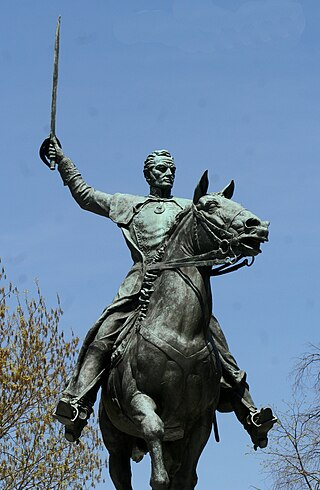
The military and political career of Simón Bolívar, which included both formal service in the armies of various revolutionary regimes and actions organized by himself or in collaboration with other exiled patriot leaders during the years from 1811 to 1830, was an important element in the success of the independence wars in South America. Given the unstable political climate during these years, Bolívar and other patriot leaders, such as Santiago Mariño, Manuel Piar, José Francisco Bermúdez and Francisco de Paula Santander often had to go into exile in the Caribbean or nearby areas of Spanish America that at the moment were controlled by those favoring independence, and from there, carry on the struggle. These wars resulted in the creation of several South American states out of the former Spanish colonies, the currently existing Venezuela, Colombia, Ecuador, Peru and Bolivia, and the now defunct Gran Colombia.

Ambato is a city located in the central Andean valley of Ecuador. Lying on the banks of the Ambato River, the city also sits beneath several tall mountains. It is the capital city of the Tungurahua Province, situated at an elevation of 2,577 meters above sea level. It is variously nicknamed "City of Flowers and Fruits", "Land of the Three Juan's", and "Garden of Ecuador." Ambato's inhabitants are called Ambateños or Guaytambos. The current mayor of Ambato is Diana Caiza.
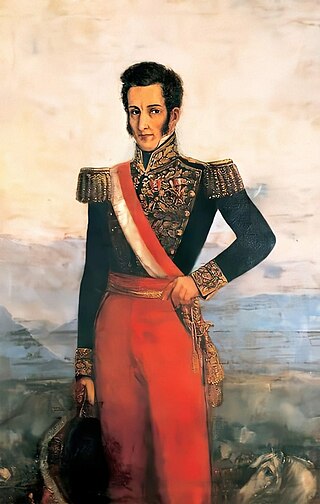
José Domingo de la Merced de La Mar y Cortázar was a Peruvian military leader and politician who served as the third President of Peru.

The Battle of Pichincha took place on 24 May 1822, on the slopes of the Pichincha volcano, 3,500 meters above sea-level, right next to the city of Quito, in modern Ecuador.
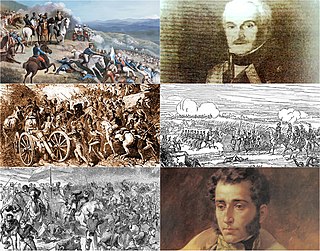
The Ecuadorian War of Independence, part of the Spanish American wars of independence of the early 19th century, was fought from 1809 to 1822 between Spain and several South American armies over control of the Real Audiencia of Quito, a Spanish colonial jurisdiction which later became the modern Republic of Ecuador. The war ended with the defeat of the Spanish forces at the Battle of Pichincha on May 24, 1822, which brought about the independence of all the lands of the Real Audiencia of Quito.

The Peruvian War of Independence was a series of military conflicts in Peru from 1809 to 1826 that resulted in the country's independence from the Spanish Empire. Part of the broader Spanish American wars of independence, it led to the dissolution of the Spanish Viceroyalty of Peru.

José María Córdova Muñoz, also known as "Hero of Ayacucho", was a General of the Colombian army during the Independence War of Colombia, Perú, and Bolivia from Spain.

The Protectorate of Peru, also known as the Protectorate of San Martín, was a protectorate created in 1821 in present-day Peru after its declaration of independence from the Spanish Empire. The protectorate existed for one year and 17 days under the rule of José de San Martín and Argentina.

The Free Province of Guayaquil was a South American state that emerged between 1820 and 1822 with the independence of the province of Guayaquil from the Spanish monarchy. The free province had a provisional government and constitution until its annexation by Gran Colombia in 1822. Its successor was the Department of Guayaquil forming part of Gran Colombia.
The Spanish province of Guayaquil had been separated from the Viceroyalty of Peru and in those days it only depended legally on the court of the Real Audiencia de Quito. About a decade later, the Departments of Guayaquil, Azuay, and Ecuador separated from Gran Colombia forming the current Ecuador.

The 1827 Guayaquil uprising, also known as the Guayaquil Department rebellion, was a rejection of the centralist policies of Gran Colombia. This was one of the first separatist rebellions in the country of Gran Colombia before it dissolved in 1829.

The October 9 Revolution was a successful revolt against the Spanish Empire in Guayaquil on October 9, 1820. It was led by the General Antonio José de Sucre and directed by Simón Bolívar. The revolt established a revolutionary junta and created the Free Province of Guayaquil, an independent state. The independence of Guayaquil revived the war of independence of the Real Audiencia de Quito as part of the Spanish American wars of independence. Prominent events in the revolution include the uprising of the Spanish garrison in the city of Guayaquil and the control of the Pacific by the Liberating Expedition of Peru, under the command of José de San Martín.
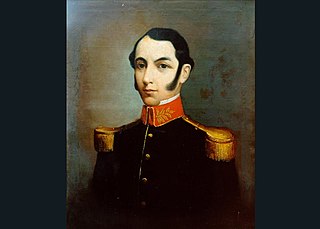
Luis Urdaneta Farías was a Venezuelan soldier and revolutionary who participated in several military campaigns of the Spanish American Wars of Independence. Initially part of the troops loyal to the Spanish Empire, he switched sides during the conflict. He participated and played a leading role in the independence of Guayaquil. He fought in several battles under the command of Marshal Antonio José de Sucre in the Southern Campaign and in the Gran Colombia–Peru War. He insurrectioned against Juan José Flores' attempted separation of the Southern District from Gran Colombia.

The Nariño Southern Campaign was a series of military actions between December 1813 and May 1814, under command of Antonio Nariño, leader of the Republican State of Cundinamarca, against Spanish forces in the south of New Granada.
It had the objective of dislodging the Royalist presence in the south after the defeat of the first independence movement in the province of Quito (1812), a fact that put the New Granada provinces, that had retained their early independence, at risk. Nariño's army took the city of Popayán and the surroundings of Pasto, but was decisively defeated in the Battle of Ejidos de Pasto, ending the campaign in total failure.

The Battle of Camino Real, was the first battle in the Ecuadorian War of Independence, that took place on 9 November 1820. The battle was fought between Royalist soldiers in support of the Spanish Empire, and the Patriot forces of the Free Province of Guayaquil, who won the battle.

The Battle of Yaguachi or Battle of Cone was a military confrontation that occurred on 19 August 1821 between Guayaquil independence troops and Grancolombian reinforcements, led by Antonio José de Sucre, against Royalist troops led by Colonel Francisco González. The battle was fought near the city of Yaguachi, current Province of Guayas in Ecuador, and was a victory for the Patriots which ensured the definitive independence of the Free Province of Guayaquil.

The Second Battle of Huachi was a confrontation that occurred on 12 September 1821 between pro-independence troops led by General Antonio José de Sucre and Royalist troops led by General Melchor Aymerich, president of the Real Audiencia of Quito. Sucre, after having won the Battle of Yaguachi on 19 August, advanced towards Quito. The Spanish, who followed closely, positioned themselves to do battle in a field called Huachi, where they had already defeated Guayaquil forces a year before.

The Pasto Campaign was a series of military operations carried out between 1822 and 1824 by Gran Colombia against the Royalist strongholds of San Juan de Pasto and Patía, Cauca in present-day Southern Colombia.

José Mires was a military born in Ireland as John Mires, who fought in the Spanish American wars of independence.
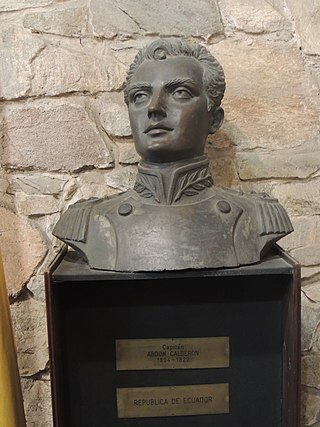
Abdón Calderón Garaycoa was a hero of Ecuador's war of independence. He died at age 17 from wounds sustained at the Battle of Pichincha. Such was his heroism that Simón Bolívar not only promoted him post-mortem but also decreed that in the future the first company of the Yaguachi battalion be reviewed as if he were alive, an honor rarely seen in military history.

Campaigns of the South is the name given to a series of military campaigns that Greater Colombia launched between 1820 and 1826 in South America with the purpose of expanding over the territories of the current republics of Colombia and Ecuador, as well as consolidating the independence of the republics of Peru and Bolivia. This was an extension of the multifaceted civil war launched against the Royalist Army in the Americas, which sustained the integrity of the Spanish Empire in such territories. Beyond the surrender of the regular armies, the royalist guerrillas in each country fought for several more years.



















